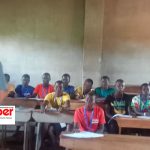In Uganda, we have already embarked on several accelerator actions using a partnership approach including the Parish Development Model, Rt Hon Justine Kasule Lumumba to delegates at the SDG SUMMIT 2023 in New York. #WhisperEyeNews
Rt Hon Justine Kasule Lumumba while speaking at a Side Event of the SDG summit 2023 stated that the Government of Uganda is honoured to be partnering with the Government of Ghana, United Nations Department of Economic and Social Affairs (UN DESA), UN Women in Uganda, CSO Partnership for Development Effectiveness (CPDE) and Reality of Aid Africa in convening the side event where a very important topic of ‘Accelerator Actions and Partnerships for SDG Delivery’ was to be discussed.
At this midpoint in the SDG implementation journey, it is important that we double up our efforts. The global statistics on SDG progress as well as the national progress for many countries point to clearly challenging times. While the world struggles to recover from the COVID-19 pandemic, we still have to come to terms with other crises that include; adverse climate change effects, civil wars and governance challenges in some parts of the world, natural calamities like floods and earthquakes, and associated economic challenges.
While we all agree as world leaders that accelerator actions are necessary, we also recognize that these cannot be implemented in siloes.
She emphasized that as a world, we have to work together. We have to collaborate in designing actions that will impact not only one country, region, but global efforts towards achieving the SDGs.
Partnerships are therefore the ‘new normal’. As a world, we shall be more effective if all societal sectors – business, government, and civil society are pulling in the same direction. We need to draw from the unique competencies of all development actors and ensure that resources come together to create forms of value that would otherwise be impossible to create by only one actor.
In Uganda, we have already embarked on several accelerator actions using a partnership approach; including the Parish Development Model which is our strategy for organizing and delivering public and private sector interventions for wealth creation and employment generation at the parish level which is the lowest economic planning unit in the country. This way we shall ensure that the 39% of Ugandans in the subsistence economy join the money economy.
We are already partnering with Ugandan scientists and inviting concepts supported from scientists in all sectors; public, private, and civil society institutions and supporting them through the National Research and Innovation Fund, and the Presidential Initiative on Epidemics (PRESIDE). We have registered success in various research and innovation projects. Examples include locally made non-irritating herbal sanitary pads that meet the needs of rural poor women and girls; bio-chemicals and microbes that kill mosquito larvae and prevent malaria in the country; low-cost solar powered water pumps to aid farmers in irrigation among others.
In our understanding of partnerships, we should not only restrict them to Goal 17. Global, national, and subnational partnerships are also essential for enhancing accelerator actions and facilitating the delivery of all Sustainable Development Goals (SDGs).
In Uganda, the Prime Minister chairs the National Partnership Forum which is anchored in our National Partnership Policy and National Partnership Dialogue Framework. The National Partnership Forum allows us to forge effective partnerships in a constantly evolving development landscape. We are now working on a process of repositioning the partnership dialogue framework as a space that supports and fosters political and policy awareness and behaviour change among all stakeholders.
Through the partnership forum, we shall continue to forge consensus on priority actions even in these times of growing complexity and competing ‘urgencies’ in every country. We recognize that all development actors are facing tough choices when adapting their policies, strategies, and partnerships to respond to ever-new realities and crises. Some of the tensions and dilemmas we encounter include adapting to and minimizing fragmentation, prioritizing the needs of the most vulnerable including the promotion of a right-based approach to development, achieving gender equality, and tackling global challenges such as climate change.
Within government, balancing budget support to the public sector while promoting whole-of-society approaches through projects, and finding the right balance between short-term results and long-term capacity building and sustainability are all issues to contend with.
Partnerships and dialogue are very important to any country’s development. They offer opportunities for constructive engagement even in areas where there is a divergence of opinion. Uganda will therefore continue to engage all its partners as a way of domesticating the partnership principles espoused in the Busan Partnership Agreement and the National Partnership Policy. The vision of the National Partnership Forum is to maximize the effectiveness of all forms of cooperation for development for the shared benefit of people, planet, prosperity, and peace, by putting into practice four partnership principles of; a) country ownership over the development process; b) focus on results; c) inclusive development partnerships; and d) transparency and mutual accountability.
As the world agrees on the SDG ‘rescue plan’ for the next seven years, Uganda and its partners will continue to work together in attaining the agreed accelerator action. We shall continue to mobilize partner support and commitments in full recognition of the urgency of the matter at hand and the need to create a refined modus operandi if we are to reach the SDG targets.



